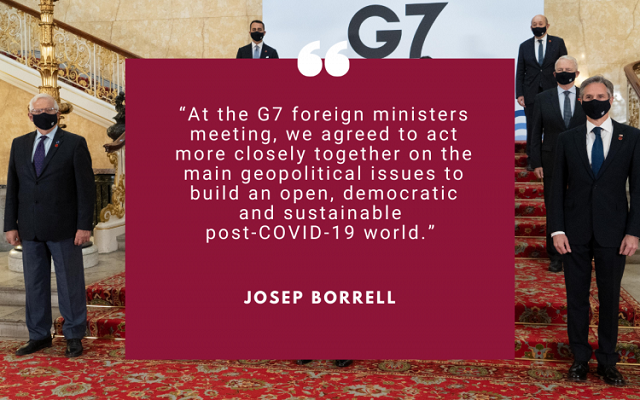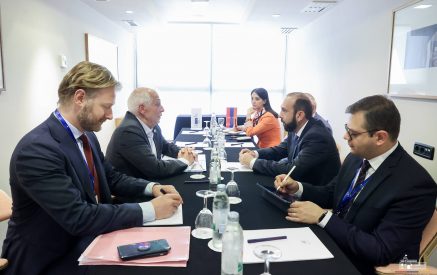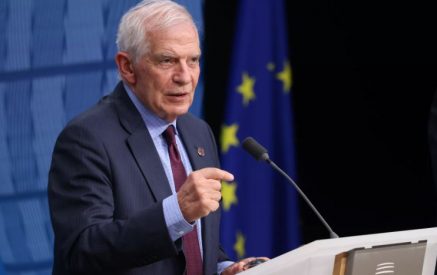From the blog by EU High Representative Josep Borrell
– This week, I spent two days in London, meeting the foreign ministers of the G7 countries and of the Indo-Pacific region. We had thorough discussions on the main geopolitical issues and agreed to act more closely together in order to build an open, democratic and sustainable post-COVID-19 world.
Together with my EU colleagues Heiko Maas, Jean-Yves Le Drian and Luigi di Maio, we met Marc Garneau from Canada, Toshimitsu Motegi from Japan, and Antony Blinken from the United States, with Dominic Raab from United Kingdom hosting us at the magnificent Lancaster House. The foreign ministers of India, Korea, Australia, South Africa and Brunei (which currently chairs ASEAN) were also invited to participate to our discussions on the Indo-Pacific region and the sustainable recovery. This was the first time since 2019 that we could meet physically in this format. It was a reminder of how essential face-to-face exchange and informal and more personal discussions are for diplomacy.
A wide array of pressing geopolitical challenges
Preparing the G7 summit of heads of state and government, which will be held from 11 to 13 June in Cornwall at the United Kingdom, we discussed a wide array of pressing geopolitical challenges, such as relations with China, Iran and the JCPOA, the coup d’état in Myanmar, the Indo-Pacific, the situation in Libya and Syria, the crisis in Ethiopia, the tensions in Somalia, the difficulties encountered in the Sahel, the situation in the Western Balkans, relations with Russia and the crises in Ukraine and Belarus, as well as the situation in Afghanistan.
Read also
In addition to this intense ‘world tour’, we also tackled several cross-cutting issues, essential to maintain open societies in the post-COVID-19 world, such as freedom of the media, religion and belief, the fight against arbitrary detentions, cyber governance and internet shutdowns, sanctions and the fight against disinformation and foreign interference.
Discussions on vaccines, education and hunger
We also addressed some of the main issues that can slow down recovery: the issue of vaccines and how to accelerate their global roll-out; education, which in many places came to a standstill during the crisis; and the fight against hunger with the COVID-19 pandemic having significantly increased food insecurity on the planet.
“The global pace of vaccination today is far too slow to deal effectively with the pandemic worldwide.”
Regarding vaccines, I initiated the discussion by expressing my concerns on the need to accelerate the vaccine roll-out globally. I recalled that, as stated recently for instance by Ricardo Hausmann(link is external) from the Kennedy School at Harvard, the global pace of vaccination today is far too slow to deal effectively with the pandemic worldwide. At the current pace, the whole world will not be vaccinated before 2023. There is a growing risk that the new variants will undermine the efficiency of the vaccines that we are currently using. COVID-19 could become chronic, weakening the economic recovery.
The COVAX facility is playing a fundamental role in helping poor countries to vaccinate their populations, and the European Union has strongly supported it from the very start. However, COVAX does not manufacture vaccines or create additional production capacity. As Prof. Hausmann says, COVAX is acting as a fair organiser of a long queue of people waiting to get vaccinated and therefore manages scarcity.
The Intellectual Property Rights waiver on COVID-19 vaccines
In Europe, we have been exporting so far as many vaccines as we have been using for our own population. However, this is not the case everywhere. We discussed on how some countries producing vaccines are now banning exports or taking measures that disrupt supply chains. This lack of production capacities raises the question of a possible waiver on Intellectual Property Rights on COVID-19 vaccines.
There are different views on this measure, depending on the assessment about its effect on the capacity to produce more rapidly more vaccines. We have taken note of the recent US position on this issue expressed by President Biden. As EC President von der Leyen said today, “The European Union is ready to discuss any proposal that addresses the crisis in an effective and pragmatic manner. That is why we are ready to discuss how the U.S. proposal for a waiver on intellectual property protection for COVID-19 vaccines could help achieve that objective”.
Several bilateral meetings
I also had the opportunity to meet bilaterally with US Secretary of State Antony Blinken and my Japanese and Canadian colleagues. In addition to that, I exchanged views with the Ministers from South Korea, India, South Africa and Brunei (which currently chairs ASEAN). I finally met bilaterally with Dominic Raab, the UK Foreign Secretary and G7 host. It was indeed our first face-to-face exchange since the UK officially left the EU, and we agreed on an Establishment Agreement for the EU Delegation to the UK that includes giving the European Union Ambassador in London full ambassadorial status.
“The main lesson I personally have drawn from this G7 meeting, and I would like to share with you, is that there is a real determination among these democratic, like-minded countries to further step up their cooperation, to face challenges together.”
We have discussed a great number of complex issues over these two and a half days. The result of our discussions is reflected in the comprehensive communique that we have issued. The main lesson I personally have drawn from this G7 meeting, and I would like to share it with you, is that there is a real determination among these democratic, like-minded countries to further step up their cooperation, to face challenges together.
In recent years, partly because of the difficult relations with the previous US administration, it was sometimes difficult to find common ground among the G7 countries and to use it to its full potential. G7 meetings themselves had tended to become places of confrontation rather than cooperation. Those days are fortunately over.
A positive boost to the EU-US relations
Joe Biden’s presidency has already given a positive boost to relations between the EU and the United States – and this G7 meeting shows that this trend goes well beyond EU and US: the represented democracies largely share the same analysis of the global situation and of the risks to peace and stability in various regions of the world posed by the rise of authoritarian regimes. This requires democratic countries to pull together.
“For our democratic model to prevail globally, we still have a lot of work to do together to convince our partners in emerging and developing countries that this is the right way forward for their future and the well-being of their citizens.”
This said, for our democratic model to prevail globally, we still have a lot of work to do together to convince our partners in emerging and developing countries that this is the right way forward for their future and for the well-being of their citizens. In this respect, our capacity to act together to help the entire world recover from the COVID-19 pandemic and its social and economic effects is of crucial importance.
We do not want a world permanently divided into rivalling blocs.
We do not want a world permanently divided into rivalling blocs. A global community is needed to solve global problems, such as the COVID-19 pandemic (and other potential future pandemics), climate change, biodiversity loss or nuclear proliferation. Our goal is to build a post COVID-19 global multilateral framework based on democratic values and fundamental rights already recognised by the United Nations in 1948.
“Our goal is to build a post COVID-19 global multilateral framework based on democratic values and fundamental rights.”
In recent years, this goal has seemed increasingly out of reach. This G7 meeting has now provided renewed confidence in our ability to change the global balance in favour of democracy and freedom.
European Union


























































